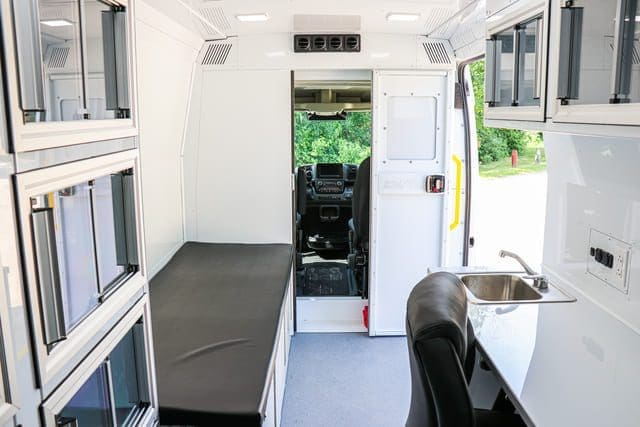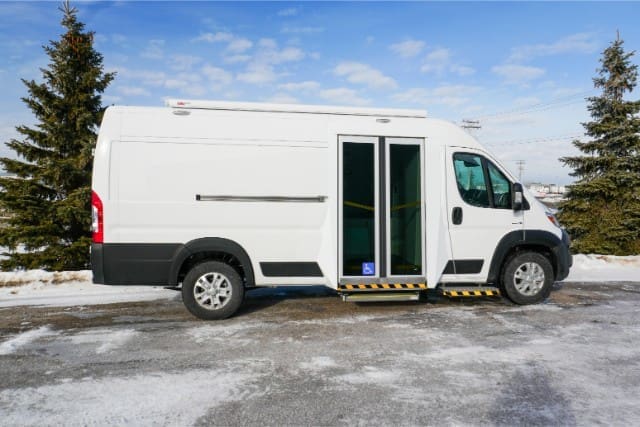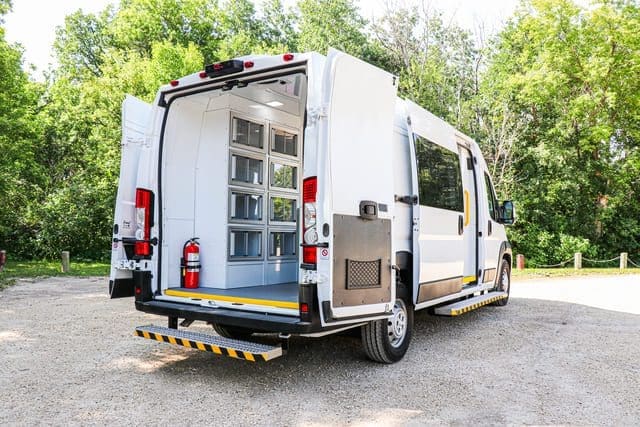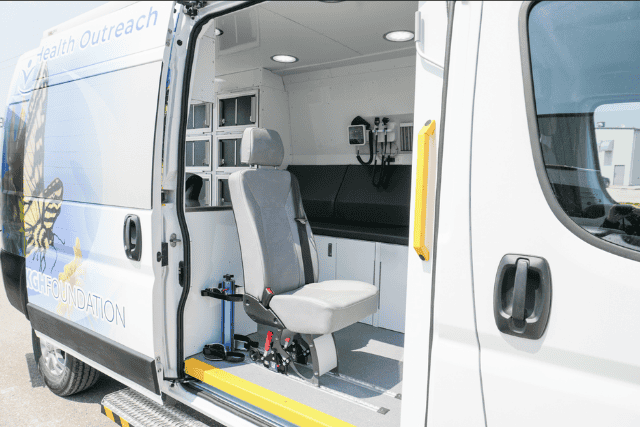If you’re finding that your mobile clinic isn’t helping patients like it used to, a mobile clinic replacement might be on the horizon. You might be feeling frustrated, wondering if these issues are temporary or a sign that it’s time for something new.
Aging mobile clinics can become unreliable, break down more often, or cost too much to repair. When your clinic can’t meet patient needs, it impacts your ability to deliver quality care—and that’s a serious problem. But think about what the world would be like with a new mobile clinic. Patients will receive effective healthcare, and more lives will be saved.
At AVAN Mobility, we get it. We know how tough it is to maintain an older mobile clinic, especially when lives are on the line. We’ve been helping organizations like yours for over 10 years, designing mobile health vehicles that break down barriers to healthcare. While we aren’t the only manufacturer, our priority is to inform you so you can make the best decision—even if that means considering all your options.
In this article, we’ll cover five signs that it might be time for a mobile clinic replacement so you can ensure your team has the tools needed to provide the best care possible well into the future.
5 signs it’s time for a mobile clinic replacement
Deciding whether to replace your mobile clinic can be tough. But ignoring the signs can lead to bigger problems. If you hold onto an outdated mobile clinic, you’re risking more than just frequent breakdowns. Let’s talk about the real risks of using an old, unreliable unit.
What are the risks of an outdated mobile clinic?
Patient safety: An older mobile clinic could put patients at risk. If it breaks down, patients could be left waiting for care, or worse, not get it at all.
Service disruptions: An unreliable clinic can lead to canceled appointments. These interruptions affect your reputation and may cause patients to lose trust in your service.
Increased costs: Older units often need more repairs, which can add up quickly. Investing in a mobile clinic replacement might make more sense when you’re constantly paying for maintenance.
Limited access to technology: Newer clinics offer the latest medical technology and tools, such as telehealth. Sticking with an older unit might mean you cannot provide the best care available.
If any of these risks sound familiar, it might be time to seriously consider a mobile clinic replacement. In the next sections, we’ll go through the five key signs that indicate your clinic is ready for an upgrade.
1. Frequent breakdowns and repairs: A top sign your mobile clinic needs replacing
If your mobile clinic is constantly breaking down and is in the shop for repair more often than not, it might be time to start thinking about a mobile clinic replacement. Frequent repairs are frustrating and can also drain your budget and impact your ability to deliver quality care. Let’s look at why breakdowns and repairs are a major red flag.
Why are frequent breakdowns a problem?
Costly repairs: Regular repairs add up quickly. You’re paying for parts, labor, and potentially even towing fees. As we mentioned earlier, over time, these costs can become higher than simply investing in a new mobile clinic.
Lost productivity: When your mobile clinic is in the shop, it’s not out there serving patients. That means missed appointments, rescheduling headaches, and possibly lost revenue.
Increased downtime: Unreliable clinics spend more time off the road. Each breakdown could mean days—or even weeks—before you’re fully operational again.
Impact on patient trust: Patients rely on you to be there. Frequent cancellations or delays due to vehicle issues can hurt your reputation and erode trust over time.
If breakdowns are becoming more common than smooth operations, it’s a clear indicator that it’s time to consider a mobile clinic replacement. With a new, reliable unit, you can stay focused on providing consistent, dependable mobile healthcare without the constant worry of what will break down next.
2. Regulatory compliance: Is your mobile clinic still up to code?
It might be time for a mobile clinic replacement if you’re finding it hard to keep up with changing regulations. Compliance isn’t something you can ignore, and sometimes modifying an older clinic to meet new standards is just too costly. Let’s explore how regulations impact your mobile clinic and why an upgrade might make more sense.
What’s the challenge of staying compliant with an older clinic?
Constant updates: Regulations around healthcare and vehicle standards change regularly. These updates often include safety features, emissions standards, and accessibility requirements. If your mobile clinic isn’t keeping up, it could lead to fines, shutdowns, or even losing your operating license.
Modification costs: Upgrading an older mobile clinic to meet new regulations can be expensive. You may need to retrofit parts, add new equipment, or even replace systems entirely. In some cases, the cost of these modifications is nearly as much as a new clinic.
Risk of non-compliance: If your clinic doesn’t meet current standards, you’re at risk of penalties. Worse, if an incident occurs and your clinic isn’t up to code, it could lead to legal and financial repercussions.
So, if you’re constantly battling to stay compliant, considering a mobile clinic replacement may be more practical. A new mobile medical unit will already meet the latest standards, saving you the hassle and expense of constant modifications.
3. Changes in services: Does your mobile clinic still meet your needs?
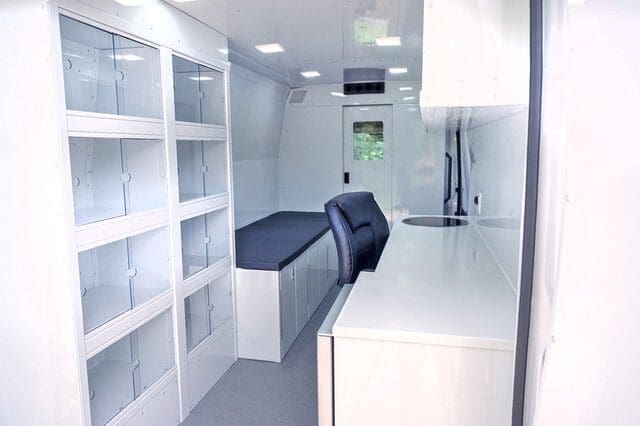
When you first got your mobile clinic, it was likely equipped for a specific set of services. But if your organization’s focus has shifted, it’s worth asking if your current unit can still do the job.
For example, maybe you started out offering mobile primary care, but now you need to provide behavioral healthcare. A mobile clinic replacement might be the best way to support these new services.
Why might evolving services call for a new unit?
Specialized equipment: Different types of healthcare require different tools. A mobile clinic set up for primary care may lack the specific equipment needed for mobile dialysis.. Retrofitting an old unit can be costly and might not fully meet your new needs.
Space limitations: Your existing clinic may not have the layout flexibility to accommodate the expanded services you want to offer. Behavioral healthcare, for example, might need more privacy than a fully open-concept clinic.
Patient comfort: Different services often mean different patient needs. Behavioral healthcare patients may require a more calming environment, with privacy and comfort prioritized. Upgrading to a new mobile clinic can give you a better chance to create an environment that aligns with your new goals.
If you’re finding that your current clinic doesn’t quite match up to the new services you’re providing, a mobile clinic replacement could be the answer. It’s an investment in a unit better suited for the care you offer today—and one that can adapt as your services evolve.
4. Serving new areas: Is your mobile clinic still a good fit for where you operate?
Has your mobile clinic moved from urban streets to rural areas or the other way around? If you’re serving a new type of area, your current mobile clinic might not be cutting it. Sometimes, the needs of rural and urban communities are so different that sticking with the same old setup just doesn’t work.
Why does changing locations mean a new mobile clinic?
Rural roads: If you’re now serving rural areas, your clinic could be dealing with long drives, rough terrain, and fewer nearby services. Older units may struggle with all that extra mileage, and they may not have the self-sufficiency they need out in the countryside. You’d need a specific setup, like the Trail Edition Upgrade, to navigate these roads.
City challenges: On the other hand, if you’re working in a place like New York City, with a population of over 8 million people, you’re also probably navigating heavy traffic, tight parking spots, and busy streets. Your mobile clinic might need to be more compact and agile to squeeze into tight spots and handle city conditions.
Different healthcare needs: Rural and urban areas usually have different needs. Rural areas might need more general check-ups, while city clinics often focus on specialized care. If your current clinic can’t adapt to these new demands, it might be time to think about an upgrade.
When your service area changes, your mobile clinic should too. A mobile clinic replacement can help you meet the unique challenges of your new location and keep delivering the care your community needs.
5. Grant eligibility: Does your mobile clinic meet funding requirements?
If you’re using grants to help fund your mobile clinic, you probably know that many grants have specific rules. These rules often say your clinic needs to do certain things or have certain features to get the required funding. If your current clinic doesn’t fit these rules, it could stop you from getting important funding.
Why grant rules might mean it’s time for a new clinic:
Needed features: If your clinic can’t do what’s entailed in specific grant criteria, you might not be able to get the funding you need. A new mobile clinic can help you meet these requirements.
Staying up to code: Many newer grants also have regulations about safety, equipment, and medication storage. If your older mobile clinic doesn’t follow these rules, fixing it up might cost a lot and still not meet all the requirements. For example, if you have imaging equipment in your mobile medical van, it needs to have certified radiation protection included.
Missing out funding: Not qualifying for grants means you could miss out on money that could help you serve your community. A new mobile clinic that fits the grant rules can help you get more funding and keep providing important services.
If grants are a big part of how you get money for your clinic, making sure your mobile clinic replacement meets the rules can really help. With a new clinic, you can feel good about applying for funds that support your mission and help your community.
Is it time for your mobile clinic replacement?

You likely landed on this article because your mobile clinic has seen better days, and you’re wondering if it’s time to replace it. After reading, you learned about five important indicators, from frequent breakdowns to changes in the services you provide.
At AVAN Mobility, we understand that your mission is to help your target community with the best healthcare possible. For over 10 years, we’ve specialized in building mobile clinic vans that reduce barriers to healthcare and save lives.
We take pride in our work and are dedicated to making sure you have the best mobile medical vehicle to meet your needs. If you have questions about your next mobile clinic replacement van, click the button below to talk to a mobility expert.
If you’re not ready to talk to a mobility expert yet, we have a few other resources you should check out to learn more.
As we’ve already been talking about mobile clinic replacements in this article, you might be wondering how much they cost. Check out the video below to learn more about that.
After that, read our article on mobile medical van customization. You’ll learn about some of the modifications you can make to serve your healthcare team and patients better.
